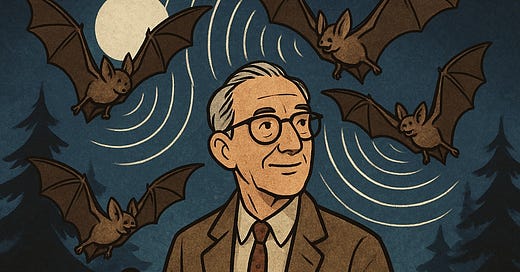Donald Griffin's Legacy: Exploring Animal Consciousness
What do animal life histories tell us about their subjective experience?
Last week, I published a commentary titled “Donald Griffin, Cognitive Ethology, and Animal Life Histories” in the scientific journal Animal Sentience.
The occasion was a new and excellent biography of Donald Griffin by Carolyn Ristau. You may not be familiar with the name, but Griffin was one of the discoverers of bat echolocation while still an undergraduate at Harvard.
Griffin met strong opposition from scientists who initially denied bat echolocation and later resisted his call for an evolutionary investigation of other animal minds. He labelled this discipline cognitive ethology, after the European ethologists who studied animal behaviour in the wild rather than solely in the laboratory, as the behaviourists did. This pioneering work made him the modern father of animal-minds research, but the field only truly blossomed in the last ten years, which he did not live to witness.
Nevertheless, his arguments for studying animal minds profoundly influenced my own research and led me to propose the pathological complexity thesis in my book A Philosophy for the Science of Animal Consciousness.
The pathological complexity thesis states that consciousness evolved to help agents cope with the complexity of their life histories. Modern life-history theory provides the best framework for understanding the lives of animals and the challenges they face. It enables us to ask which kinds of subjective experience would be advantageous for them, thereby advancing Griffin’s original aim of studying animal minds from an evolutionary perspective. To achieve this, we must analyse the trade-offs animals confront in their daily lives.
Consider for example, the choice of whether to leave the safety of a burrow to forage for food at the risk of being detected by a predator or to stay hidden. Trade-offs between alternative decisions are constant and animals make use of consciousness to accurately weigh the value of alternative actions
When you venture into nature and observe animals, ask yourself: what are they doing, and why? How does their behaviour contribute to their survival and reproduction? Cultivating this Darwinian sensibility will allow us to design better experiments on the experiential capacities of other animals in the future.
This blog post originally appeared on Psychology Today, following editorial review and editing.
References
Ristau, C. A. (2024). Birds, Bats and Minds. Tales of a Revolutionary Scientist: Donald R. Griffin. (Vols 1-3) WBI Studies Repository.
Veit, W. (2025). Donald Griffin, cognitive ethology, and animal life histories. Animal Sentience. 35(19).
Veit, W. (2023). A philosophy for the science of animal consciousness. Routledge.



